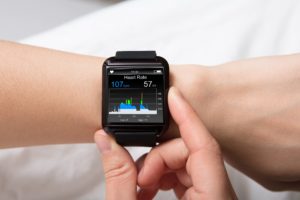 Nowadays, it seems like everyone has a fitness tracker around their wrist. It’s great that people are monitoring their activity and heart rate, but how many people know what their heart rate is trying to tell them?
Nowadays, it seems like everyone has a fitness tracker around their wrist. It’s great that people are monitoring their activity and heart rate, but how many people know what their heart rate is trying to tell them?
First and foremost, a healthy heart rate is between 60 and 100 beats per minute. You can easily determine yours by placing two fingers over the pulse point on the inside of your wrist. Count each beat you feel for at least 30 seconds and then double that number to determine your beats per minute (BPM). Or, if you wear a tracking device, the work is done for you.
Advertisement
Heart rate is easily influenced by several different factors including what we eat and drink; whether we’re standing, sitting, or laying down; stress; age; emotions; medications, and even air temperature.
Generally, a lower resting heart rate suggests that you’re healthier, as your heart doesn’t have to work as hard to pump blood throughout the body. On the other hand, too slow of a heart rate can reveal a problem.
Here is some of the information you can pick up by monitoring your heart rate.
What Your Heart Rate Reveals about Your Health
Slow heart rate: Athletes tend to have slow heart rates, as low as 40 BPM. In a person who is not an athlete, a slow heart rate could signal a health problem. A slow heart rate may be a sign that there’s a problem with the sinoatrial node (your natural pacemaker), or it could be a sign of hypothyroidism. A slow heart rate is associated with dizziness, tiredness, weakness, and confusion. It’s essential you get your slow heart rate checked out, as it could contribute to more serious health problems.
Fast heart rate: Depending on what you’re doing, a fast heart rate could be normal. But if you have a fast heart rate without a factor influencing it, then it could signal a problem. Diseases, infections, medications, hyperthyroidism, asthma, anemia, vitamin deficiencies, and fevers can all contribute to a faster heart rate.
A fast resting heart rate could also signal a person’s poor physical fitness level. In physically unfit people, the heart may not work efficiently and have to work harder, even at rest. It has been suggested that those with a resting heart rate between 81 and 90 BPM triple their risk of death. Other accompanying symptoms include chest pains, shortness of breath, palpitations, tightness, dizziness, lightheadedness, and fatigue.
Target Heart Zone
To make sure you’re working out safely, it may be wise to calculate your maximum heart rate. This is the maximum number your heart should reach while exercising. With this number, you can calculate your target heart zone, which reveals where your heart rate should be during moderate to vigorous activity.
To calculate your maximum heart rate, you subtract your age from 220. For example, a 50-year-old’s maximum heart rate would be calculated like this: 220-50=170 BPM. A 50-year-old’s target heart zone during activity would need to be 50 to 85 percent of their maximum heart rate, so between 85 to 144 BPM. Knowing this range can keep you safe during your workouts.
But knowing your heart rate is just one part of the puzzle. Perceived heart rate is also important, which is what you believe your heart rate to be during activity. If you’re working out hard and you perceive yourself to have a high heart rate, it probably is quite high. Being too high can increase your risk of complications.
Advertisement
During moderate activity, you should be able to carry a conversation while sweating. During vigorous activity, you shouldn’t be able to speak but still be able to breathe rapidly. If you are finding it challenging to maintain your breath, then you need to reduce your intensity.
So many different factors can influence your heart rate, but if you suspect that a more serious condition is responsible for your heart rate changes, always speak to your doctor.
Also read:
- How to calculate your target heart rate
- Resting heart rate chart: Factors that influence heart rate in elderly
- Tachycardia treatment at home: How to treat rapid heart rate naturally
